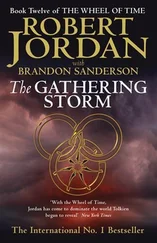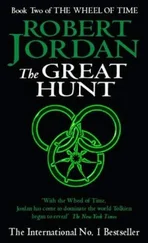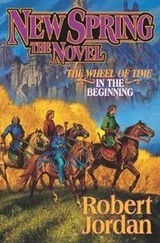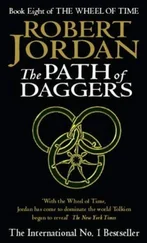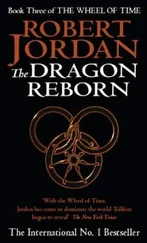Climbing onto Jeade'en, Rand pulled Aviendha up behind him without letting her use a stirrup, just to show her that he could, and kicked the dapple into motion before she was settled. She flung both arms around his waist, grumbling only partly under her breath; he caught a few more snippets of her current opinion of Rand al'Thor, and of the Car'a'carn , too. She made no move to let go, though, for which he was grateful. Not only was it pleasant having her pressed against his back, the support was welcome. With her halfway to the saddle, he had suddenly not been sure whether she was coming up or he down. He hoped she had not noticed. He hoped that was not why she was holding on to him so tightly.
The crimson banner with its large black-and-white disc rippled behind Pevin as they zigzagged down the hill and along the shallow valleys. As usual, the Aiel gave little attention to the party as it passed, though the banner marked his presence as surely as the encircling escort of several hundred Far Dareis Mai easily keeping pace with Jeade'en and the mules. They went on about their business among the tents covering the slopes, at most glancing up at the sound of hooves.
It had been startling to hear of nearly twenty thousand prisoners taken from Couladin's followers — until leaving the Two Rivers, he had never really believed so many people could be in one place — but seeing them was twice the shock. In clusters of forty or fifty, they dotted the hillsides like cabbages, men and women alike sitting naked in the sun, each cluster under the eyes of one gai'shain if that. Certainly no one else paid them much mind, though now and again a cadin'sor —clad figure approached one of the groups and ordered a man or woman off on an errand. Whoever was called out went at a run, unguarded, and Rand saw several returning to slip back into their places. For the rest, they sat quietly, almost looking bored, as if they had no reason to be elsewhere, or desire to be, either.
Perhaps they would put on white robes just as calmly. Yet he could not help remembering how easily these same people had violated their own laws and customs already. Couladin might have begun the violation or ordered it, but they had followed and obeyed.
Frowning at the prisoners — twenty thousand, and more to come; he would certainly never trust one to hold to gai'shain — it took some time before he noticed an oddity among the other Aiel. Maidens and Aielmen who carried the spear never wore anything on their heads except the shoufa , and never any color that would not fade into rocks and shadows, but now he saw men with a narrow scarlet headband. Perhaps one in four or five had a strip of cloth knotted around his temples, with a disc embroidered or painted above the brows, two joined teardrops, black and white. Perhaps most strangely of all, gai'shain wore it, too; most had their cowls up, but every last bareheaded one wore it. And algai'd'siswai in their cadin'sor saw and did nothing, whether wearing the headband or not. Gai'shain were never to wear anything that those who could touch weapons did. Never.
"I do not know," Aviendha said curtly into his back when he asked what it meant. He tried to sit up straighter; she really did seem to be holding to him more tightly than necessary. After a moment, she went on, so softly that he had to listen sharp to catch it all. "Bair threatened to strike me if I mentioned it again, and Sorilea hit me across the shoulders with a stick, but I think they are those who claim we are siswai'aman ."
Rand opened his mouth to ask the meaning — he knew a scant few words of the Old Tongue, no more — when interpretation floated to the surface in his mind. Siswai'aman . Literally, the spear of the Dragon.
"Sometimes," Asmodean chuckled, "it is difficult to see the difference between oneself and one's enemies. They want to own the world, but it seems you already own a people."
Turning his head, Rand stared at him until amusement faded and, shrugging uncomfortably, he let his mule fall back beside Pevin and the banner. The trouble was that the name did imply — more than implied — ownership; that was out of Lews Therin's memories, too. It did not seem possible to own people, but if it was, he did not want to. All I want is to use them , he thought wryly.
"I see you don't believe it," he said over his shoulder. None of the Maidens had donned the thing.
Aviendha hesitated before saying, "I do not know what to believe." She spoke as quietly as before, yet she sounded angry, and unsure. "There are many beliefs, and the Wise Ones are often silent, as if they do not know the truth. Some say that in following you, we expiate the sin of our ancestors in… in failing the Aes Sedai."
The catch in her voice startled him; he had never considered that she might be as worried as any other Aiel about what he had revealed of their past. Ashamed might be a better word than worried; shame was an important part of ji'e'toh . They were ashamed of what they had been — followers of the Way of the Leaf — and at the same time ashamed that they had abandoned their pledge to it.
"Too many have heard some version of part of the Prophecy of Rhuidean now," she went on in a more controlled tone, for all the world as if she had heard a word of that prophecy herself before she began training to become a Wise One, "but it has been twisted. They know that you will destroy us…" Her control faltered for the space of one deep breath. "But many believe that you will kill us all in endless dances of the spear, a sacrifice to atone for the sin. Others believe that the bleakness itself is a testing, to wear away all but the hard core before the Last Battle. I have even heard some say that the Aiel are now your dream, and that when you wake from this life, we will be no more."
A grim set of beliefs, that. Bad enough that he had revealed a past they saw as shaming. It was a wonder they had not all left him. Or gone mad. "What do the Wise Ones believe?" he asked, as quietly as she.
"That what must be, will be. We will save what can be saved, Rand al'Thor. We do not hope to do more."
We. She included herself among the Wise Ones, just as Egwene and Elayne included themselves among Aes Sedai. "Well," he said lightly, "I expect Sorilea at least believes I should have my ears boxed. Probably Bair does, too. And certainly Melaine."
"Among other things," she mumbled. To his disappointment, she pushed away from him, although keeping a hold on his coat. "They believe many things I could wish they did not."
He grinned in spite of himself. So she did not believe he needed his ears boxed. That was a pleasant change since waking.
Hadnan Kadere's wagons lay a mile or so from his tent, circled in a broad depression between two hills where Stone Dogs kept watch. A cream-colored coat straining over his bulk, the hatchet-nosed Darkfriend looked up, mopping his face with the inevitable large handkerchief, as Rand rode past with his banner and loping escort. Moiraine was there as well, examining the wagon where the doorframe ter'angreal was lashed under canvas behind the driver's seat. She did not even glance around until Kadere spoke to her. By his gestures, he was plainly suggesting that she might want to accompany Rand. In fact, he appeared eager for her to go, and small wonder. He had to be congratulating himself on keeping his being a Darkfriend hidden so long, but the more he was in company with an Aes Sedai, the more he was in danger of discovery.
Indeed, it was a surprise to Rand that the man was still there. At least half of the drivers who had entered the Waste with him had slipped away since crossing the Dragonwall, replaced by Cairhienin refugees chosen by Rand himself, to make sure they were not of Kadere's sort. He expected every morning to find the fellow himself gone, too, especially since Isendre's escape. The Maidens had nearly torn the wagons apart looking for the woman, while Kadere sweated his way through three handkerchiefs. Rand would not regret it if Kadere managed to sneak off in the night. The Aiel guards had orders to let him go, so long as he did not try to take Moiraine's precious wagons. More obviously every day, their loads were a treasure to her, and Rand would not see her lose them.
Читать дальше




